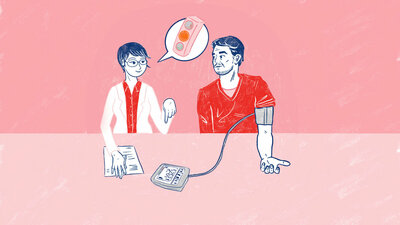2023: Your Preventive Check-Up Year - Your Opportunity

Everyone should be aware of the opportunity of early detection and other health check-ups, but not many actually take advantage of it.
© Getty Images/E+_alvarez, Westend61; iStockphoto/stockfour, Ridofranz
In March 2020, a new virus is beginning to conquer in the world. Subsequent lockdowns are forcing us to stay at home and to avoid contact with other people as much as possible. Many people avoid going to the doctor’s practice during the Corona pandemic. And thus neglect their all-important preventive health check-ups. Just one example: The number of cancer screening exams dropped by more than eight million in the first year of Corona, according to the Barmer health insurance.
We have by now lived with the pandemic for almost three years. You would be forgiven to think that things have changed again in terms of the check-ups. Unfortunately, that is not the case. ‘Partially, Germans are preventive check-up stick-in-the-muds’, says Dr Gerhard Schillinger, head of medical matters at the national association of the AOK local health care funds. In 2021, the second year of the pandemic, still fewer people took part in examinations for early cancer detection. The trend continued during the Omicron variation wave in the beginning of 2022, as a study conducted by the Scientific Institute of the AOK (WIdO) shows. To give just one example: In the first months of 2022, the number of people undergoing a skin cancer screening had decreased by nearly 20 per cent compared to the same period in 2019.
The importance of early detection
‘The objective of early detection is to detect a serious disease early enough for it to not yet cause any symptoms and for the chances of a full recovery to be as high as possible’, Dr Susanne Weg-Remers at the German Cancer Research Centre (DKFZ) in Heidelberg explains. In the case of skin cancer, first effects of the delayed check-up appointments have already become noticeable. Dermatologist Dr Peter Mohr reported at a skin cancer conference in September 2021 that private practices as much as hospitals had encountered ‘significantly bigger melanomas on average in 2020 compared to 2019’.
Susanne Weg-Remers, too, is concerned: ‘Initial data from the Saarland region indicate that fewer bowel cancer diagnoses were made in the pandemic year of 2020. I thus fear that in the coming years, more cases of bowel cancer at an advanced stage will be diagnosed.’ The Saarland numbers are just preliminary research results, however. Overall, it remains to be seen if tumour types for which we have well-functioning early detection exams are indeed detected later due to Covid 19. Health insurers cover the costs of check-ups for bowel, breast, cervical, prostate and skin cancer. It remains to be seen in the death statistics if indeed more people die of these types of cancer than before the pandemic.
Why few people do early cancer detection
It has long been a topic of debate for doctors and health insurers to find out why people do not take advantage of early cancer detection exams as often as they could. ‘There was room for improvement even before the pandemic’, AOK physician Schillinger states. Even before 2020, only half of all 65-year-olds had had a colonoscopy in the previous ten years. Just under a third of men between the age of 54 and 70 had their prostate examined. However, the numbers were better for the early detection of cervical cancer. More than 80 per cent of women between the age of 29 and 40 had their cervix examined in accordance with the recommendations, as AOK data indicate. ‘Men are particularly lazy about preventive check-ups’, Dr Ursula Marschall at the Barmer health insurance confirms: ‘Women go for a check-up, men go for repair. Quite often, they only visit a doctor’s surgery when pain or discomfort can no longer be denied at all.’
Nevertheless, a total of 83 per cent of people consider cancer prevention to be an important topic, according to a Forsa opinion poll commissioned by the AOK in September 2021. But here, too, the results indicate: The situation is particularly different among men under 45 years of age. 30 per cent of them do not think the topic is that very important. Thus, it is not too surprising that 78 per cent of women say that they go regularly or tendentially regularly to preventive health check-ups, while only 54 per cent of men say the same. ‘Participation increases with age. And we also notice that socially disadvantaged groups with little formal education make less use of early detection exams’, says Jürgen Klauber, chief executive of the Scientific Institute of the AOK.
Women clearly benefit from early detection examinations. Cervical cancer check-ups are certainly a success story. In 1971, this type of cancer was still the most common malignant tumour in young women, with 16,000 new cases per year. The number of new cases per year has today been reduced to 4,300: almost a quarter of the previous figure. With the help of early detection, many precancerous stages can be detected and thus treated early on. Bowel cancer screenings work similarly well. In the first ten years following the introduction of the examination in 2002, about 180,000 colon carcinomas were prevented by a colonoscopy, according to data gathered by the German Cancer Research Centre. ‘That is one result in every 28 examinations’, Klauber substantiates.
The impact of the Corona pandemic
Klauber is worried that the Corona pandemic will still have a negative impact upon bowel cancer cases: ‘In the past two years, the number of colonoscopies even for in-patients has fallen to an extent that is truly colossal.’ At the same time, far fewer bowel cancer surgeries were executed. ‘Proportionally more severe cases went into hospital. The less severe cases, without any symptoms yet, have probably not been admitted so far.’
But fear alone will not get people to do preventive check-ups. All experts agree on this. In an AOK survey, 43.5 per cent of the interviewees said they were afraid that cancer would actually be detected in a screening. Also, in rare cases, there might be an overdiagnosis, according to Susanne Weg-Remers: ‘Tumours get diagnosed that may never have caused problems in the lifetime of the patient.’ Because it also depends on whether it is a fast-growing type of tumour, and how effective the available treatment options are. In addition, there may be a false alarm, a result that needs to be clarified and that – in the end – turns out to be harmless.
What is beneficial, what is harmful? ‘In order to be able to decide for yourself, you should be well-informed’, says Weg-Remers. The check-up examinations are carried out in many different ways. Blood tests, palpation, breast mammography involving X-rays. A colonoscopy can be done under sedation or under short anaesthesia. If you are worried about the side effects of anaesthesia or X-rays, you should talk to your doctor before the examination.
Which examinations make sense
There are in fact examinations whose benefits are questionable. An ultrasound examination of the ovaries, for example, does not necessarily improve the chances of curing a detected tumour, according to the Institute for Quality and Efficiency in Health Care (IQWiG), which is financed by the insurance fees of the statutory health insurers’ clients. The PSA test for the early detection of prostate cancer is also controversial. The test determines the amount of ‘prostate-specific antigen’ in the blood. An above-average level can indicate a tumour. Men have to pay for the test themselves; the statutory health insurance funds do not cover it.
So how to decide what makes sense for you? The benefits of the screening programmes for bowel cancer, breast cancer and cervical cancer – all paid for by your health insurance – have been scientifically proven to be worth your while, says Weg-Remers. The side-effects of the check-ups are minimal, the cancer is reliably detected and there are demonstrably effective treatment options for the tumours even at a less advanced stage. ‘You should make use of these offers if you want to reduce your personal risk of dying from cancer.’
The earlier you detect a type of cancer or its precursors, the better you can treat it. Prevention is something else. It is a regular check-up for risk factors leading to life-threatening diseases. The objective: to prevent and counteract the development of these diseases. The general health examination, i.e. the check-up, is covered by public health insurers once from the age of 18 onwards. From the age of 35, it takes place every three years in your general practitioner’s practice – if you chose to do so.
What is the point? Let’s look at two examples: High blood pressure or an elevated plasma lipid concentration do not cause specific symptoms for quite a while. If left untreated, however, they can lead to cardiovascular diseases such as strokes or heart attacks. ‘The objective of the check-up is to systematically look for abnormalities and illnesses that would otherwise slip through the net. If you go to the doctor’s office because of your knee, the knee is examined; if you have the flu, the flu is treated. High blood pressure might just be overlooked’, Jürgen Klauber states.
An effect of the pandemic?
There are no exact figures on how many Germans skipped their check-ups during the pandemic. The Barmer health insurance has calculated that 36.4 per cent fewer people took advantage of the check-up in 2020. However: The question remains whether Corona is the main reason for that. Or if it is rather the reduced entitlement to the check-up introduced in 2019. Probably both. ‘Many patients have skipped the check-up once, especially at the height of the pandemic. This is not dramatic at first, but should by no means become the rule’, says Professor Nicola Buhlinger-Göpfarth, deputy chairperson of the German Association of General Practitioners.
General practitioner Dr Christian Kunkel from Amberg near Nuremberg is also convinced that some of his patients missed the preventive health check-up during the pandemic: ‘The check-up is only once every three years, so we don’t easily notice if someone skips it once’, he says. Where he did notice skipped exams, however, was in the disease management programmes. These are voluntary health programmes to monitor patients with chronic diseases such as diabetes more closely. ‘Before Corona, patients were checked quarterly. Missed it once or twice – after that, some of the patients’ levels were significantly worse. That was the result of: less exercise, but the food tasted all the better’, Kunkel summarises.
If you find yourself thinking right away: ‘I felt the same way during the pandemic’ – then you are not alone. An online survey compiled by the Technical University of Munich in April 2021 indicated that about 40 per cent of the 1001 interviewees had gained weight since the start of the pandemic - 5.5 kilogrammes on average. A vicious circle both for those already ill and for healthy people: Poor eating habits and a lack of exercise promote obesity as much as high sugar and blood fat levels. All serious risk factors for serious secondary diseases.
Everyone should get checked
You believe you are too young for preventive care? And you also feel healthy? Up to 30 million people in Germany have high blood pressure, that is almost one in three, according to the German Hypertension League. About 30 percent of them are unaware of their high blood pressure, although hypertension is the number one risk factor for several cardiovascular diseases. Particularly among men aged around 40, the number of affected people had already risen significantly before the Corona pandemic, according to a study conducted by the Robert Koch Institute in 2015.
Nevertheless, conspicuous levels in the check-up do not necessarily mean that you need to go on drugs straight away. However, they can provide good reasons to change one’s lifestyle and to think about one’s diet. Here’s an idea: Start with small changes. If you know your cholesterol levels are too high, it could be one less slice of cream tart on Sundays. ‘My advice: Attend preventive check-ups to stay healthy for the next few years’, says Gerhard Schillinger. ‘After all, you don’t miss your car check-up, either.’ Health insurers and doctors are trying to raise awareness and draw attention to the check-ups and screenings on offer. But reaching all patients will probably remain impossible, Schillinger says: ‘The problem is not those who are totally health-conscious, but those who don’t bother with it.’
Dentists have suffered the consequences of the Corona pandemic most severely. Especially during the strict lockdown, many people postponed their annual check-up appointment. In the second quarter of 2020, 16.4 per cent fewer patients came to the dental practices than in the second quarter of 2019. According to the German Federal Association of Sick Fund Dentists (KZBV), women were slightly more reticent than men, and older people compared with younger people. The differences were not significant, however.
Some have made up for the 2021 check-up since. Especially when it comes to dental health, the following applies: Go for your preventive check-ups! It's good both for your teeth and your wallet. And don't forget to get the stamp in your dental bonus booklet when you go for a check-up: That will save you money should you ever need a dental bridge or cap.






